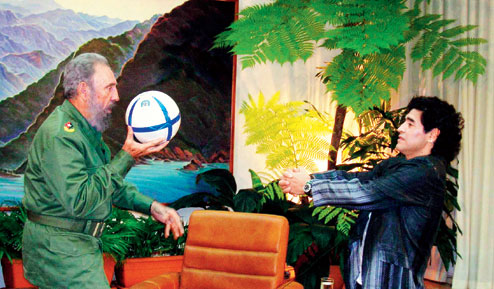
New Delhi, Nov. 26: The Cuban Revolution was his template when Nelson Mandela was assigned the task of starting a guerrilla army against apartheid in the early 1960s.
Mandela says as much in his autobiography Long Walk to Freedom.
Today, a foundation set up in Mandela's memory chose its words carefully in its tribute to Fidel Castro.
"The first country we approached was the United States of America. We could not even succeed to come close to the government, and they refused to assist us," the Nelson Mandela Foundation quoted Madiba - the clan name by which South Africans affectionately addressed Mandela - from a documentary shot in 1990.
"But Cuba, the moment we appealed for assistance they were ready to do so and they did so. Why would we now listen to the Western world when they say we should have nothing to do with Cuba? It is just unreasonable."
When he was released from prison after 27 years, Mandela had visited Cuba to thank Castro for his support. Castro had returned the favour by travelling to South Africa for Mandela's inauguration as the country's first black President.
Mandela was not singed because of this friendship the way Gabriel Garcia Marquez was. Castro was Marquez's "blind spot", wrote Mexican historian Enrique Krauze in The New York Times on the author's death in 2014.
Marquez's "literary achievement", Krauze said, "has been overshadowed by a moral failing: his long, intimate friendship with Fidel Castro and (far more important) his unflinching acceptance of the worst abuses of the Cuban regime".
Their friendship went back to January 1959, when Marquez arrived in Cuba as a journalist. The author wrote some of his best-known works, including One Hundred Years of Solitude, while based in Cuba.
Castro himself was an Ernest Hemingway fan, though the two are known to have met only once when they fished together on May 15, 1960, in an angling contest named after the author.
Castro's David-like equation with the American Goliath made him the beacon of hope for those struggling against the odds. King of the ring Muhammad Ali went to the extent of swimming against the tide to ferry medical supplies to the island, not once but twice.
From his first visit - when Ali was yet to make his mark - there is an iconic photograph of Castro telling Ali to "hit me, here", while pointing to his chin.
Another civil rights activist who earned a place in Castro's galaxy was Malcolm X. When a Manhattan hotel refused to house Castro and his delegation - in New York to attend the UN General Assembly in 1960 - the African American leader welcomed him to a Harlem hotel.
Several decades later, Castro took a Venezuelan army officer - and leader of a failed coup attempt in Caracas - under his wings, resulting in the Wall Street Journal billing the alliance as "Cubazuela" once Hugo Chavez became the President of his country.
Castro outlived most of his friends. Practically, the only one known to be close to him still alive to mourn his passing is Diego Maradona.
When the footballer fell prey to drug abuse, Castro had stepped in to open Cuba's famed health facilities to Maradona. The intervention is said to have saved Maradona's life.
"He was like a father to me...," Maradona was today quoted by TyC Sports as saying. "I'll go to Cuba to say goodbye to my friend."











